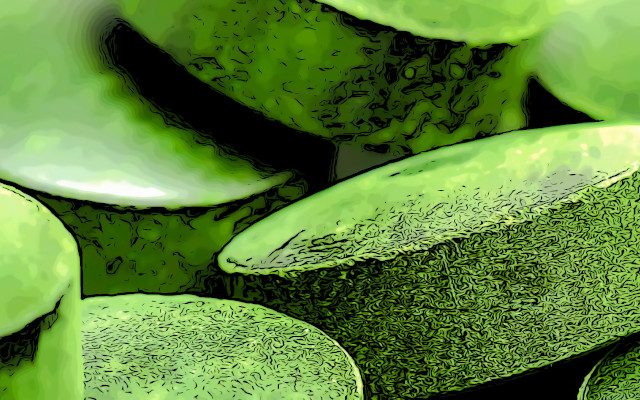Recent studies have identified in marine microalgae a number of bioactive compounds with possible anti-viral action, against Covid-19 as well as other viruses. (1)
Algae, microalgae and cyanobacteria garner increasing attention from the scientific community. With different perspectives on the development of veterinary medicines and drugs, as well as food and feed.
Algae, microalgae, cyanobacteria and health
Algae are classified into red (rhodophytes), brown (pheophytes) and green (chlorophytes). Several studies already show their anti-viral activity. Much of the research to date has been directed at the interaction of some of them with HSV and HIV. (2) More recently, research has been extended to their possible role with respect to influenza viruses (3) and, most recently, to Covid-19.
Microalgae
and cyanobacteria (photosynthetic bacteria, or blue algae) in turn are capable of producing sulfur polysaccharides and other compounds with important biological activities.
In particular, possible anticarcinogenic, anti-microbial, immunomodulatory, anti-diabetic, anti-tubercular, anti-epileptic, anti-hypertensive, anti-atherosclerotic, anti-osteoporosis, anti-inflammatory, and finally anti-viral actions have been observed. (4)
Research in these areas appears worthy of further study because of the specific properties found in various organisms. Which could also prove to be ideal candidates for industrial production of compounds with antiviral action due to the relative simplicity of large-scale cultivation. (5)
Spirulina, biological activities
Spirulina(Arthrospira platensis) is a cyanobacterium capable of performing photosynthesis, on par with algae. It can be grown in fresh and salt water because of its great adaptability. And it is capable of producing numerous bioactive compounds with antifungal, antibacterial and antiviral actions. (6)

Fig. 1. Scheme of extraction and purification of algal polysaccharides and possible applications (Xu et al., 2017)
SARS-CoV-2 inhibition in vitro by kombu seaweed
Kombu(Saccharina japonica) is a brown seaweed traditionally used in oriental cuisine (Japanese cuisine especially). Sulfurated polysaccharides have been extracted from it and have shown, in vitro, a remarkable ability to inhibit SARS-CoV-2 virus.
Compared with Remdesivir, an antiviral drug, Kombu seaweed extracts appear to be safer in both modes of intake (oral/nasal vs intravenous) and absence of contraindications, at the doses tested. (7)
Antiviral actions of algae
Viral infections generally develop in three stages:
1) Virus adhesion, adsorption, entry and invasion of the cell,
2) virus replication,
3) maturity and release of viral particles. (8)
The sulfur groups in the algae appear to be the agent responsible for specific antiviral actions. Especially in phase 3, hypothetically also in phase 1. Understanding these mechanisms underlies the prospect of producing specific formulations with antiviral action. (9)
The meta-analysis
A meta-analysis of scientific research published in the past 10 years shows the activities of some algae species against herpes, acquired immune deficiency and influenza viruses:
– HSV (herpes simplex virus). Porphiridium cruentum, Dunaliella salina, Haslea karadagensis, Sargassum naozhouense, Schizymenia binderi, Cystoseira indica,
– HIV(human immunodeficiency virus). Arthrospira platensis, Agardhiella tenera, Dictyota mertensii, Lobophora variegata, Fucus vesiculosus, Spatoglossum schroederi,
– influenza viruses. Gyrodinium impudicum, Nanofrustum shiloi, Eckolina cava, Sargassum pluriferum. (10)
Griffithsin (from Griffithsia sp.), the only substance so far subjected to experimental clinical trials, is currently being studied to counter HIV because of its ability to form bonds with the virus and its low toxicity. (11)

Fig. 2. Mechanism of virus entry and antiviral action of algal-derived polysaccharides (Shi et al., 2017)
Antiviral actions of algae in animal husbandry and aquaculture
The antiviral actions of algae have also been successfully tested in aquaculture and poultry farming. As effective alternatives to the use of vaccines and especially antibiotics, the misuse of which (in animal husbandry and medicine) causes antibiotic resistance. Which in turn is listed by WHO (2019) as one of the most serious threats to public health at the planetary level.
Experimental studies have shown in particular the effectiveness of:
– Graciliaria chilensis in combating salmon anemia virus, a cause of high mortality for the species and transmissible in the environment, (12)
– Sulfurated polysaccharides from Ulva sp. and Heteromorpha sp. In combating viral infections of shrimp, including the highly epidemic and lethal white spot syndrome virus. Due to the stimulation of the crustaceans’ immune system, (13)
– Sulfurated polysaccharides from Ulva clathrata and Cladosiphon okamuranus, antiviral action in poultry species, poultry especially, against Newcastle disease virus (a cause of acute respiratory syndrome. 14)
Research Horizons
Sulfur polysaccharides-many different compounds naturally contained in algae-show interesting potential in combating the new coronavirus and other viruses affecting humans and livestock.
Phenolic compounds-including florotannins, produced by brown seaweed (15)-in turn are distinguished by powerful antioxidant action. Which detects, among other things, for immune system stimulation and antiviral activity. (16)
Dario Dongo and Andrea Adelmo Della Penna
Notes
(1) Liu et al. (2020). Research and development on therapeutic agents and vaccines for COVID-19 and related human Coronavirus diseases. ACS Cent. Sci. 6:315-331,
(2) Mattos et al. (2011). Glycolipids from macroalgae: Potential biomolecules for marine biotechnology? Brazilian J. Pharmacogn. 12:244-247,
(3) Song et al. (2016). Characterization and comparison of the structural features, immune-modulatory and anti-avian influenza virus activities conferred by the three algal sulfated polysaccharides. Mar. Drugs 14:4, doi:10.3390/md14010004
(4) Ngo et al. (2013).
Sulfated polysaccharides as bioactive agents from marine algae
. Int. J. Biol. Macromol. 62:70-75,
(5) Khan et al. (2018). The promising future of microalgae: Current status, challenges, and optimization of a sustainable and renewable industry for biofuels, feeds, and other products. Microb. Cell Factories 17:36, doi:10.1186/s12934-018-0879-x
(6) Raposo et al. (2013). Bioactivity and applications of sulphated polysaccharides from marine microalgae. Mar. Drugs 11:233-252, doi:10.3390/md11010233
(7) Kwon et al. (2020).
Sulfated polysaccharides effectively inhibit SARS-CoV-2 in vitro
. Cell Discovery 6:50,
(8) San Martin (2019).
Virus maturation – in Physical Virology (Virus structure and mechanics).
. Ed. Springer 7:129-158,
(9) Cunha et al. (2016). Sulfated polysaccharides as multifunctional materials in drug delivery applications. Mar. Drugs 14:42, doi:10.3390/md14030042
(10) Riccio et al. (2020). Ten-year research update review: Antiviral activities from marine organisms. Biomolecules 10:1007,
(11) Lee (2019).
Griffithsin, a highly potent broad-spectrum antiviral lectin from red algae: from discovery to clinical application
. Mar. Drugs 17:567,
(12) Lozano et al. (2016). Red macroalgae Pyropia columbina and Gracilaria chilensis: Sustainable feed additive in the Salmo salar diet and the evaluation of potential antiviral activity against infectious salmon anemia virus. J. Appl. Phycol. 28:1343-1351, doi:10.1007/s10811-015-0648-8
(13) Declarador et al. (2014). Ulvan extract acts as immunostimulant against white spot syndrome virus (WSSV) in juvenile black tiger shrimp Penaeus monodon. AACL Bioflux 7:153-161
(14) Aguilar-Briseño et al. (2015). Sulphated polysaccharides from Ulva clathrata and Cladosiphon okamuranus seaweeds both inhibit viral attachment/entry and cell-cell fusion, in NDV infection. Mar. Drugs 13:697-712, doi:10.3390/md13020697
(15) Samson et al. (2020). Marine algal antioxidants as potential vectors for controlling viral diseases. Antioxidants 9:392, doi:10.3390/antiox9050392
(16) Dario Dongo, Andrea Adelmo Della Penna (2020). Polyphenols and health. Immune system friendly vegetables. GIFT (Great Italian Food Trade).





